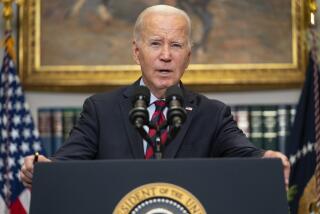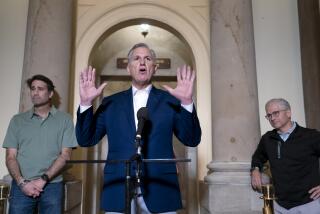Obama delays Asia trip to push healthcare overhaul
- Share via
Reporting from Washington — President Obama on Friday postponed a high-profile trip to Asia, keeping pressure on congressional Democrats to start voting next week on the long-delayed healthcare overhaul legislation and send it to him for his signature before the end of March.
The president’s change of travel plans, which will move his departure overseas from March 18 to March 21, will enable him to remain active in pushing uneasy Democrats toward final approval of his signature domestic policy initiative.
But it also underscored the fragile nature of the Democrats’ self-imposed Friday deadline for the first of a series of crucial healthcare votes in House committees.
“We stand ready to stay as long as it takes to pass a bill,” said House Speaker Nancy Pelosi (D-San Francisco), stopping short of committing the House to Obama’s timetable.
In a move that doubles the stakes for Obama, Democrats are now expected to expand the bill to include another major White House priority -- Obama’s drive to overhaul the federal college student-loan program and to increase spending for grants to low-income college students.
Democratic leaders have tentatively decided to add the student aid overhaul to the healthcare package because it generates additional budget savings and circumvents a possible obstacle in the Senate as they deploy an expedited legislative procedure known as budget reconciliation.
The Congressional Budget Office has been working to complete its analysis of the healthcare bill, which Democrats are aiming to keep to a cost of less than $1 trillion over 10 years. The CBO’s authoritative report on projected costs and effect is considered crucial to a small group of conservative Democrats who remain uncommitted on the bill.
The move to link the health and education bills is a big boost to prospects for passing the student loan bill, which is vehemently opposed by the banking lobby and faces a filibuster threat. The reconciliation process precludes a filibuster.
The risk of linking the issues, some Democrats warn, is that it would distract lawmakers from passing healthcare legislation and open them to criticism that they are larding the bill with unrelated matters that have not been well-considered by the Senate.
Obama’s proposed overhaul of federal student aid -- which now provides loans directly from the government and through private lenders that receive federal guarantees and interest subsidies -- calls for eliminating bank subsidies and instead having all loans be made through the government.
Advocates of that approach say it would be more efficient and less expensive, and Obama has proposed channeling most of the savings into increasing Pell Grants, which help the neediest students pay tuition.
The CBO estimates that the Obama plan would reduce the deficit by about $29 billion over five years.
Private lenders have lobbied hard against the plan, arguing that it would cost jobs in their industry, give borrowers less-responsive service and disrupt the delivery of financial aid in the transition. Most Republicans agree.
“It’s a very bad idea,” said Senate Minority Leader Mitch McConnell (R-Ky.). “We now have the government running banks, insurance companies, car companies, and they do want to take over the student loan business. I’m not sure the public thinks the current debate is about that issue, and would show again the lengths they are willing to go to have the government expand its tentacles into absolutely everything.”
The proposal also has met resistance from some Democrats -- including Sens. Ben Nelson of Nebraska and Evan Bayh of Indiana -- who represent states where student-loan processors and banks are big employers. Nelson and Bayh are also swing votes in the healthcare debate.
Party leaders are gambling that few, if any, Democrats would change their position on the healthcare bill because of objections to the student loan overhaul.
“Senators have a clear choice here: They can either continue to send tens of billions of dollars in wasteful subsidies to banks -- or they can start to invest that money directly in students,” said Rep. George Miller (D-Martinez), author of the student aid bill in the House.
Lawmakers are scheduled to break for a two-week Easter recess on March 26, by which time Democratic leaders hope to have completed work on healthcare legislation. The climatic actions will be the House voting on the Senate healthcare bill, and each chamber voting on the so-called budget reconciliation bill, which will contain House changes to the Senate bill. Democrats hope to begin moving the process forward next week with votes in the House budget and rules committees on the reconciliation bill.
Early next week, Obama will also travel to Ohio for another campaign-style visit to promote the healthcare overhaul.
White House Press Secretary Robert Gibbs said the president made the decision to postpone his Asia trip after Democratic congressional leaders said he could help by talking with rank-and-file lawmakers.
Republican Rep. David Dreier of San Dimas viewed that as a sign of heavy pressure to come on Democratic holdouts.
“We know that they are doing everything within their power to try and twist arms and encourage people to vote for something that is extraordinarily unpopular,” said Dreier.
More to Read
Get the L.A. Times Politics newsletter
Deeply reported insights into legislation, politics and policy from Sacramento, Washington and beyond. In your inbox twice per week.
You may occasionally receive promotional content from the Los Angeles Times.











